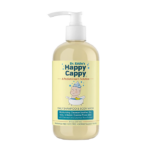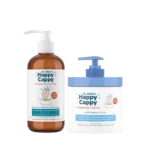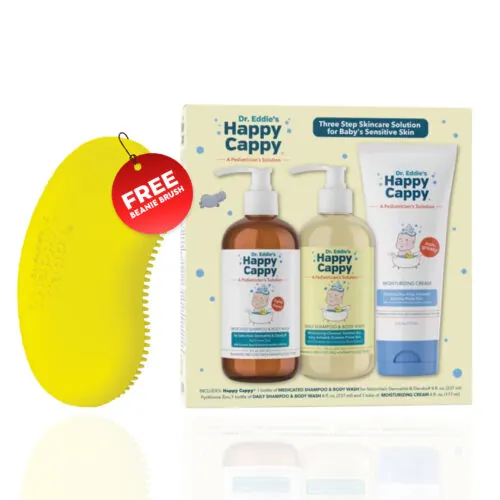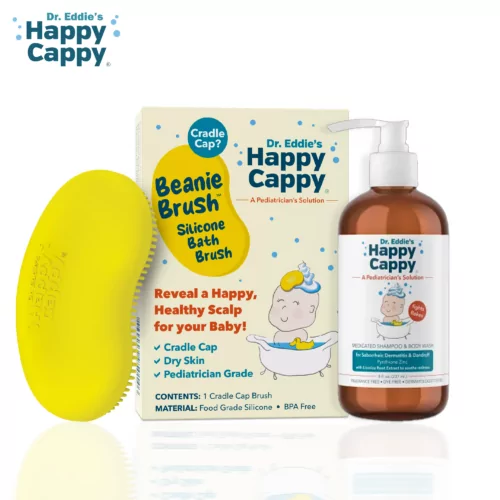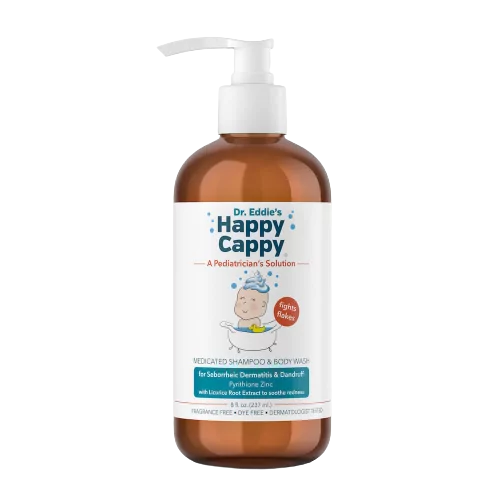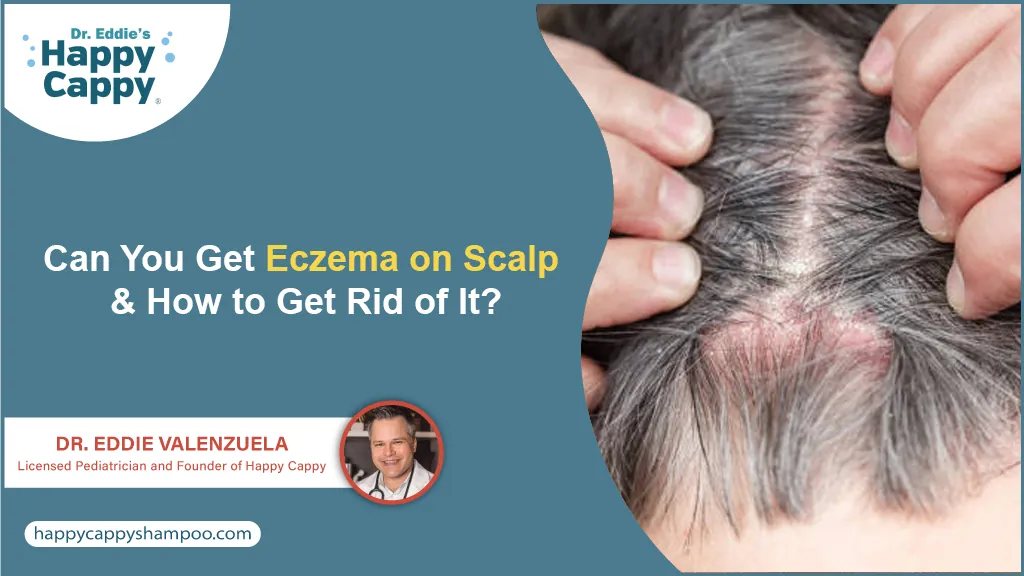
What is Eczema?
Irritation on your scalp is often caused by eczema. Wondering what is eczema? It is a chronic inflammatory skin condition that causes itching, redness, and irritation on the skin.
It usually affects your skin and is more common on the face, skin folds, arms, and legs. However, there are certain types of eczema that can also affect your scalp, these are mostly classified as dermatitis.
Read this blog to discover more about types of scalp eczema.
Can you Get Eczema on scalp?
Yes! Eczema does occur on the scalp, but other medical conditions happen much more frequently and many confuse those conditions for severe eczema. If eczema does occur in the scalp it is much more likely to happen in a young child rather than in a teenager or adult.
Eczema on an infant’s head will tend to happen more on the cheeks, but it can also edge up into the hairline and would be associated with redness and can have some overlying scale.
Types of Eczema on the Scalp
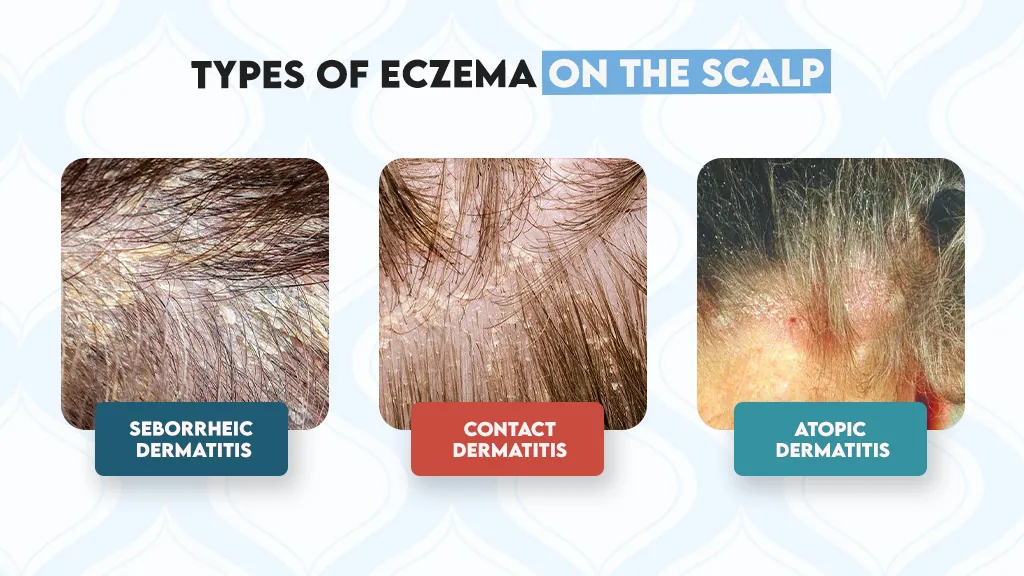
Eczema on the scalp can cause intense itching, redness, and irritation. You may feel the urge to scratch your scalp like crazy, but hold your thoughts and restrain your hands. Scratching can make your condition worse and lead to infection.
Some of the most common types of scalp eczema are:
Seborrheic Dermatitis
This is the most common type of eczema that appears on the scalp and hairline. When it appears in babies and children it is known as cradle cap. It usually causes thick scaly patches to appear on the skin along with itching, inflammation, and redness.
In children, the scales are thicker and larger than those in adults. A less severe type of seborrheic dermatitis that a large number of people experience worldwide is dandruff. Learn more about seborrheic dermatitis here.
Contact Dermatitis
Contact dermatitis is when the skin or scalp becomes irritated or allergic to a certain thing. The most common triggers that lead to contact dermatitis on the scalp are chemicals and fragrances in
- Shampoo
- Conditioners
- Hair spray and gels
- Hair dyes
- Hair extension glue
- Swimming caps
- Headgear
These products may not be harmful to the skin, but due to a weak or impaired immune system, your body may react differently when it comes in contact with them. As a reaction, dry skin, itching, and irritation may appear on the scalp.
Atopic Dermatitis
Atopic dermatitis is the most common type of eczema that appears on the skin, however, it is rare to appear on the scalp. Whenever it does it can lead to redness, dryness, and intense itching on the scalp.
Atopic dermatitis on the scalp may appear when you are experiencing severe eczema flare-ups. Skin dryness and lack of moisture on the scalp are common symptoms that cause itching.
Eczema on Scalp Symptoms
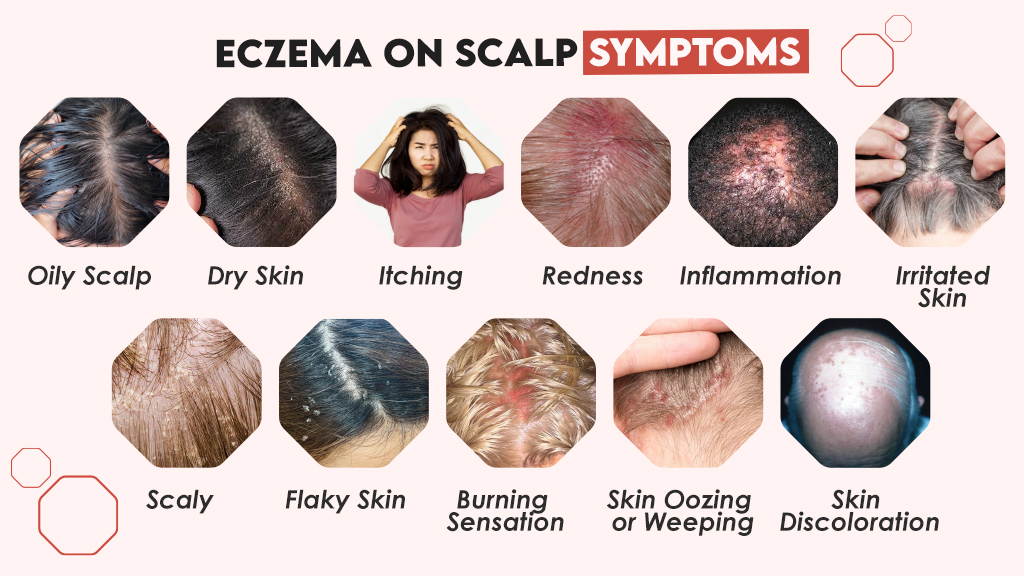
If you are wondering what does eczema look like on the scalp here is your answer. Eczema symptoms may vary for every individual depending on the severity of the condition and which type they are experiencing.
However, some common symptoms that you may notice are:
- Oily scalp
- Dry skin
- Itching
- Redness
- Inflammation
- Irritated skin
- Scaly
- flaky skin
- Burning sensation
- Skin oozing or weeping
- Skin discoloration
The redness associated with eczema may appear as red or pink in people with lighter skin tones and purple or brownish in darker skin tones.
What Causes Eczema on Scalp
There is no exact cause for eczema. Researchers believe that there are various factors and triggers that contribute to this condition. In general, eczema is believed to be caused by an impaired skin barrier.
The skin has a natural protective barrier that protects it against outside irritants and keeps it moisturized. But when this natural barrier is compromised due to any reason such as genetics, hormonal changes, weak immune system, or environmental factors the skin is unable to work properly.
This scenario leads to skin dryness, redness, itching, and irritation. This can also appear on the scalp. However, the most common eczema experienced on the scalp is seborrheic dermatitis and it develops when the skin starts producing excess sebum. The sebum when it comes in contact with a fungus known as Malassezia yeast leads to inflammation, itching, and scaling.
Other Similar Conditions
Ringworm
Children can develop other flaking conditions isolated to only a few coin-sized spots on the scalp that frequently can cause hair loss. The cause of this is fungus–if it occurred elsewhere on the body it would be referred to as “ringworm” . The fancy name for ringworm in the hair is tinea capitis.
Psoriasis
Much less common in children and adolescents than eczema, and tinea capitis, is psoriasis. This condition can happen in the hairline or the scalp and tends to have a red base with an overlying silver/white colored scale. When it appears on the scalp it is known as scalp psoriasis.
How to Treat Eczema on Scalp
Eczema on scalp treatment depends on the root cause of the condition. General eczema or more specifically atopic dermatitis on the scalp and other parts of the body can be managed by following an eczema skincare routine.
Eczema Shampoo
Now that we know the most common cause of flaking and itching of the scalp in adults is seborrheic dermatitis and dandruff we should direct you on what to do to manage these symptoms. Using an eczema shampoo to keep your scalp clean is the first line of treatment which is also often advised by dermatologists.
A medicated shampoo that contains any of the following ingredients is known to be effective in managing the condition.
- Salicylic acid
- Coal tar
- Ketoconazole
- Selenium sulfide
- Zinc pyrithione
Use a medicated scalp eczema shampoo at least two or three times a week to see visible results. For the rest of the days of the week, you can use a mild daily shampoo and body wash to keep your body and scalp clean.
Choose the Right Products
Some adult anti-dandruff shampoos contain active ingredients that can be drying, some have pungent odors, many have added dyes, and some we would not advise for use on an infant.
Ketoconazole shampoo is one such example of a product that can be drying to the skin and contains harsh lathering agents (sulfates) that can accelerate the loss of skin moisture.
For people with sensitive skin, or who have both eczema and dandruff, we advise using an over-the-counter (OTC) medicated shampoo for dandruff and seborrheic dermatitis that is free of
- Fragrance
- Dye
- Sulfates
- Parabens
These ingredients are common components that could trigger contact dermatitis on the scalp. To avoid irritation and to soothe your scalp eczema use the right products that are best suited for your skin.
Moisturizers
If you are experiencing eczema you should keep your skin moisturized with the help of an eczema cream but this can be difficult when you are experiencing it on the scalp. The hair may get in your way and make it difficult for you to moisturize your scalp.
For this, you can use a gentle eczema shampoo and body wash that contains natural ingredients like apple fruit extract, aloe vera extract, and provitamin B5 that help soothe the scalp and keep it moisturized.
However, for severe eczema, consult a dermatologist. They may prescribe the use of emollients that are in the form of gel, lotion, or oil to moisturize the scalp–make sure to use the medication only as prescribed.
Medication for Eczema on Scalp
Medications are mostly prescribed by doctors when simple treatments are not making the condition better. The doctor may advise the use of medications in the form of pills, ointments, injections, oils, gels, and creams.
These medications are always prescribed for a limited time period and should only be used as prescribed by the dermatologist to avoid complications. Some of the most common medications used for scalp eczema are:
- Topical steroids
- 1% hydrocortisone cream
- Oral antibiotics
- Antihistamines
- Biologics
Best Shampoo For Eczema on Scalp
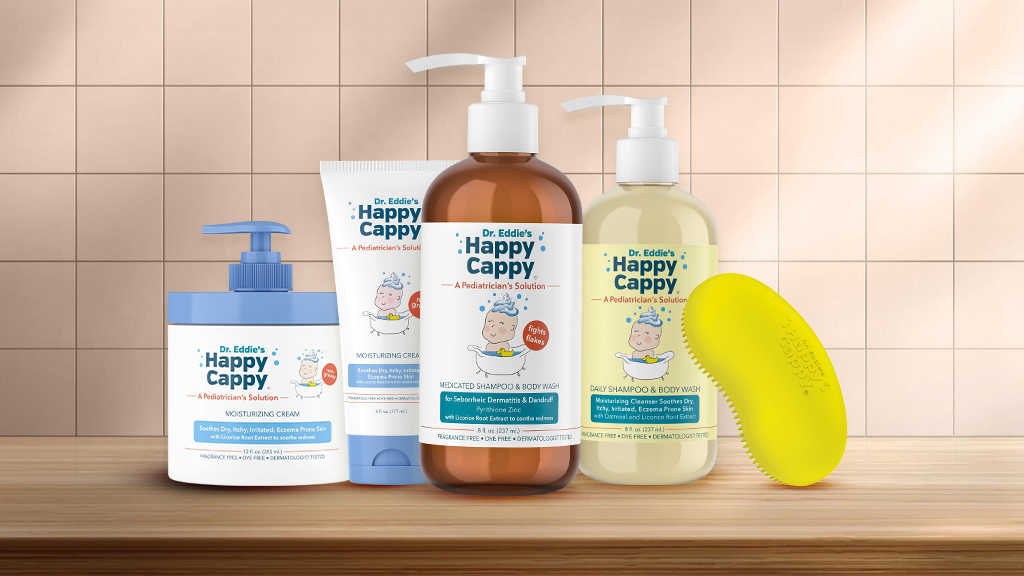
Dr. Eddie’s Happy Cappy Products do not contain added fragrance or dye. We do not use parabens or phthalates, and we have gentle surfactants that are sulfate-free.
Happy Cappy Medicated Shampoo and Happy Cappy Daily Shampoo and Body Wash are designed for children of all ages and many adults have found these products to be a fantastic addition or replacement in their tool chest for dealing with dandruff, seborrheic dermatitis, and scalp eczema.
These shampoos are pH-balanced to keep your skin’s pH optimized and are a great option as a shampoo for eczema on the scalp. All of our products contain redness soothing Licorice Root Extract and provitamin B5 to moisturize your skin, scalp, and hair.
Preventing Eczema on the Scalp
Even though it is difficult to prevent eczema on the scalp you can reduce the chances of future flare-ups by making a few lifestyle changes. Here are a few things you should do:
- If your scalp eczema is the result of contact dermatitis avoid the possible triggers that might be causing your flare-ups.
- Use lukewarm or cool water to wash your scalp instead of hot water.
- Choose your hair products that are free or contain very minimal amounts of harsh chemicals.
- Don’t scratch your scalp or pick on scales.
- Stress can also worsen the condition. So manage stress with the help of yoga, exercise, and deep breathing techniques.
- Always shampoo your scalp after a heavy workout or sweating.
Making a few simple changes to the way you take care of your scalp can help you prevent scalp eczema and other common skin conditions.
Key Takeaways
- Scalp eczema can cause itching, irritation, inflammation, and scaling on the scalp.
- There are different types of eczema that can affect your scalp like seborrheic dermatitis or cradle cap in babies, contact dermatitis, and atopic dermatitis.
- Other common conditions can also cause symptoms resembling those of eczema such as scalp ringworm and scalp psoriasis.
- If your scalp eczema is caused by contact or atopic dermatitis then use a gentle daily eczema shampoo and body wash to keep the scalp clean.
- If it is caused by seborrheic dermatitis then use a medicated shampoo that contains pyrithione zinc to soothe the symptoms.
FAQS
What is the root cause of scalp eczema?
There is not just one cause of scalp eczema. In fact it is caused by a combination of factors. Sometimes it may be triggered by environmental factors like extreme weather, or as a reaction to certain skin care products, or due to a weak immune system.
Most of the time it is caused by excess Malassezia yeast on the scalp that leads to seborrheic dermatitis.
How do you wash your scalp with eczema?
A medicated shampoo is usually used two or three times a week, and on the rest of the days you can use a gentle daily eczema shampoo.
Wet your scalp.
Apply the shampoo and leave it on for a few minutes
Then rinse the scalp thoroughly.
Make sure that you don’t leave any residue behind.
Choose a shampoo that is free from fragrances, phthalates, parabens, and sulfates.
Can oil worsen eczema on the scalp?
Yes, oils have the tendency to cause a reaction on the scalp that may lead to contact dermatitis. Applying and leaving oil on your scalp can work as a breeding ground for Malassezia yeast and can trigger seborrheic dermatitis.
Can I put eczema lotion on my scalp?
You can try and put eczema cream or lotion on your scalp to moisturize it but this can be a difficult, messy task and can be irritating. Instead consult your dermatologist–they may prescribe the use of emollients in the form of gel, spray, or oil that are easier to apply.
How do you know if your scalp eczema is infected?
Scalp eczema can get infected due to vigorous scratching or picking on scales. Here are a few signs and symptoms that may help you identify if your eczema is infected:
Pain or burning sensation on the scalp.
Pus-filled blisters.
Open sores on the skin.
Intense itching.
Swelling.
High temperature.
If you are experiencing these symptoms along with eczema then immediately consult a physician to get the right treatment plan.

